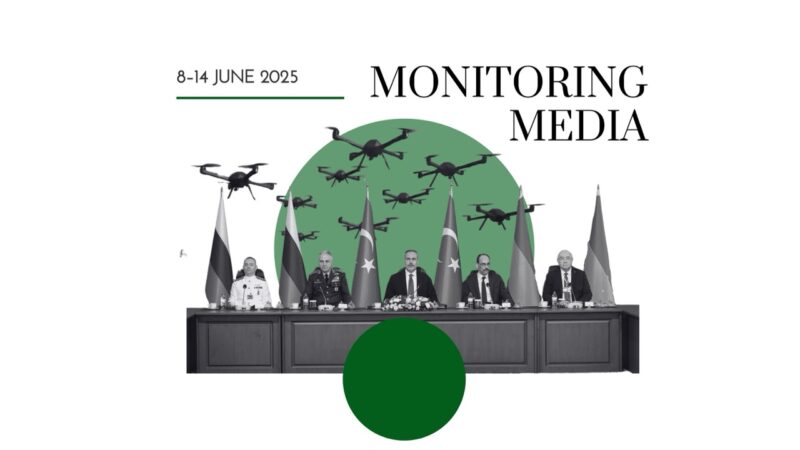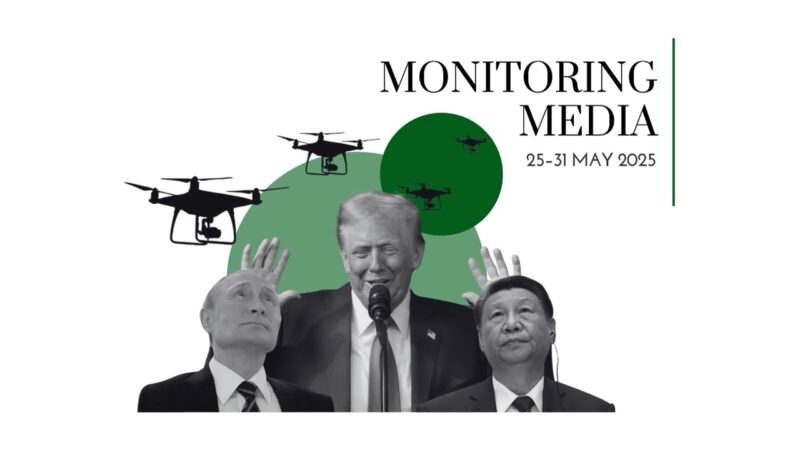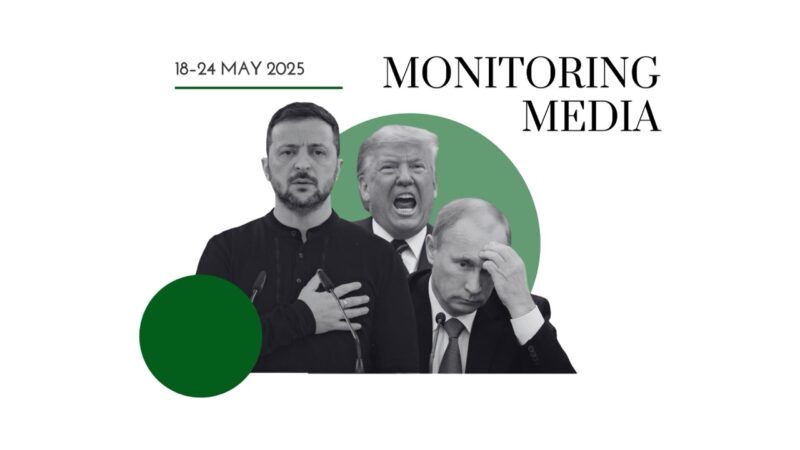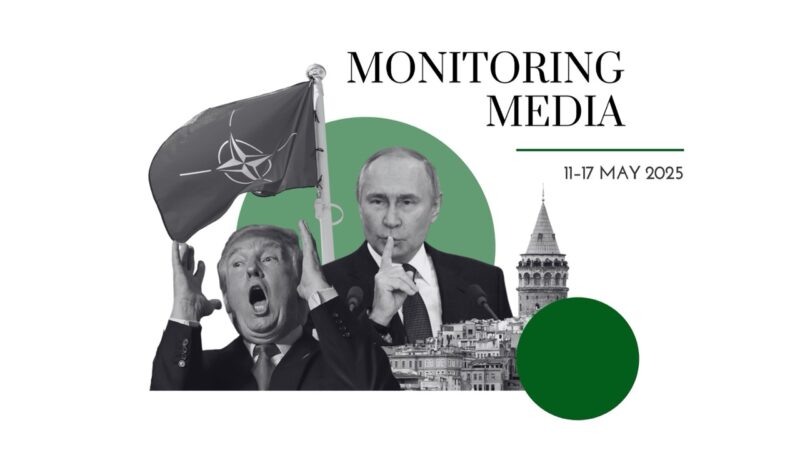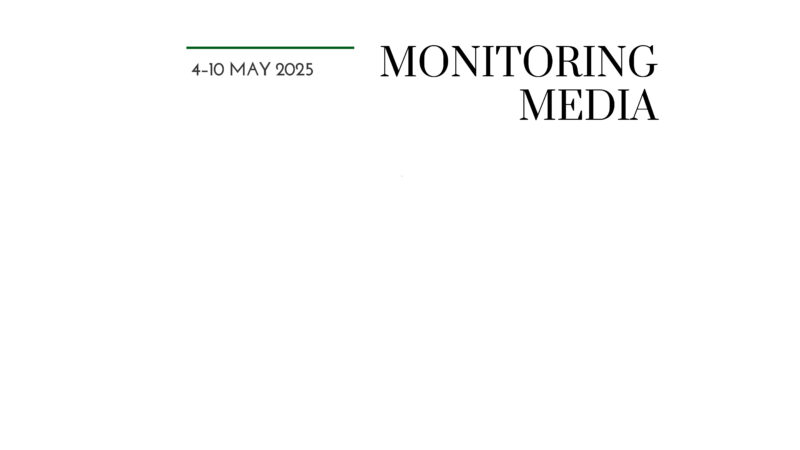Russia’s abduction of Ukrainian children is an established genocidal tactic during war

CIUS weekly report on North American media coverage of Ukrainian affairs, 1–7 April 2023
Three publications (The Conversation, The New Yorker, and National Review) were selected to prepare this report on how the situation in Ukraine has been portrayed in the North American press during the past week (1–7 April 2023). The sample was compiled based on their impact on public opinion as well as on their professional reputation, popularity among the readership, and topical relevance. These three publications represent centrist and conservative viewpoints on the political spectrum.
This report covers only the most-read and relevant articles about Ukraine, as ranked by the respective North American publications themselves in the past week. Its scope covers promoted articles on home pages and articles from special sections on Ukraine, with the hashtag #Ukraine, from the paper editions of the publications, and about Ukraine from opinion columns and editorials.
Topics featured in the selected articles:
- Ukraine’s current affairs: Northern Ireland’s peacemaking experience may help to end the Russo-Ukrainian war; Russian-speaking Ukrainians face an identity crisis; plans are being drawn to rebuild Kharkiv as a high-tech city;
- The world and Ukraine: Whether intentionally or not, US media and public figures spread many misconceptions about Ukraine; US should support Ukraine regardless of Russia’s closer ties with China; Russian cyberwarfare can ruin infrastructure and massively distort public opinion worldwide;
- Russia at war: Russia’s abduction of children and displacement of other Ukrainian citizens is a long-standing tradition of conquest; Russia’s abduction of Ukrainian children violates almost all the major provisions of international law.
Main arguments:
Ukraine and its allies may learn from Northern Ireland’s experience to end the war. Stefan Wolff (The Conversation) writes that the experience of peacemaking in Northern Ireland may be useful in ending of the Russo-Ukrainian war and resolving the issues of the territorial integrity of Ukraine. The same as happened on the British Isles, Ukraine may decide to return Crimea to its sovereignty through negotiations instead of taking it by force. Wolff drafts three lessons that Ukraine should learn from the Northern Ireland case: “The first, and most important, is about local leadership. Only if the parties in a conflict are genuinely committed to peace will an agreement last. Second, international diplomacy can make a difference in nudging the sides along to an agreement. Third, there needs to be a pathway to a face-saving deal for the conflict parties that can survive contact with reality.” Speaking of these lessons in detail, Wolff argues that the preparations for negotiations take time and should be invariably supported by all stakeholders (above all leaders and societies in Ukraine and Russia); impartial international mediation is crucial to make opposing sides negotiate instead of continuing to fight till complete exhaustion (in Ukraine’s case, the impartial and mutually acceptable mediator does not exist today); before any negotiations start, the opposing sides need to agree on basic pre-conditions (in Ukraine’s case, this may be “a commitment to the full and unconditional respect of the principles of sovereignty and territorial integrity,” to which Russia is yet to agree); and the genuine settlement of the conflict should surpass the immediate interests of the opposing sides (in Ukraine’s case, the sustainable settlement should lead to a revision of global balance of powers, reconstruction of European architecture, and Ukraine’s joining the EU and NATO). Wolff concludes that “responsible leaders in Kyiv, Brussels, Washington, Beijing, and elsewhere need to come together and work diligently towards this end and prevail against the odds just as those leaders did in Northern Ireland 25 years ago.”
Ukrainians who speak Russian today are having a major identity crisis. Zhenya Oliinyk (New Yorker) presents a vivid autobiographical story about how she transitioned from Russian to Ukrainian in her daily communication. She highlights the following aspects of Ukraine’s language landscape: for centuries, the Russian government undertook many harsh measures to disrupt the free use of Ukrainian in society; Oliinyk’s grandparents switched from Ukrainian to Russian in the mid-20th century when they moved from the countryside to the city—they “wanted to pass for normal, civilized humans”; the Russian language was positioned by the imperial and, later, Soviet governments as one for “educated intellectuals,” while Ukrainian belonged to “primitive peasants”; after Ukraine gained independence, the Ukrainian language was cleared from its stigma, but Russian prevailed in daily communication; the importance of language as a national identification marker grew after 24 February 2022: “When you’ve been speaking Russian for years, [the renewed repression of Ukrainian in occupied territories] makes you wonder—what if this part of the identity was never mine?” Russian-speaking Ukrainians are undergoing a serious identity crisis today and gradually changing their communication habits.
Master plans for Kharkiv reconstruction are being drawn. Masha Gessesn (New Yorker) writes a story of Max Rozenfeld, an architect from Kharkiv, who sees the up-to-date destruction of his city as an opportunity for its drastic renovation and change of the urban landscape. Rozenfeld likes reading books about survival in the Nazi concentration camps and argues that one of the ways to physically and mentally endure the ongoing Russian invasion is to find a meaning to live. For Rozenfeld, whose immediate family moved to Germany, this meaning resides in thinking and acting for reviving Kharkiv, particularly, designing its master plans. To do so, he joined the working group of a British high-tech style architect, Norman Foster: “At weekly Zoom meetings the group, which included members from the UN’s Economic Commission for Europe and the global engineering and design firm Arup, discussed Kharkiv’s landscape, history, and character, the extent of the damage that Russian attacks had done to the city, the city’s economy, ecology, and transportation infrastructure, and how all of those things should be restored or improved in a postwar future.” To set the tone for reconstruction, Rozenfeld puts forward the concept of Kharkiv as the frontier city, a place for inventors and dreamers, where powerful research institutions like Harvard and M.I.T. can function. Additionally, many of the destroyed buildings should be converted into functional monuments and placed under big glass domes, similar to the former Reichstag in Berlin. Finally, Rozenfeld considers that Kharkiv should also have its own “monument to life”: “It would involve creating a green wall on that bombed-out sixteen-story building in Saltivka and planting trees in the cavities formed by missiles. Kharkiv the city can become a symbol of survival.” Gessen concludes that it remains to be seen how many of Rozenfeld’s dreams will come true. Be that as it may, however, the media attention to what he and other members of Foster’s group try do is one of the key elements to success.
US media often portrays Zelensky and Ukraine in an arbitrary way. Jay Nordlinger (National Review) critically assesses the information circulating in the US media about Ukraine. A wave of reports about Russia’s abduction of Ukrainian children appeared recently; while these reports are needed to inform public opinion, some of them are extensively detailed and difficult to bear. Secondly, many politicians and media personalities in the US hate Zelensky because he became an extraordinary wartime leader: “Zelensky reminds them that there is a war on, which implicates all of us whether we like it or not…he reminds us that a little courage—moral, physical, and political—is requisite. A lot of people would like to write Ukraine off and return to business as usual. The Ukrainians are terribly inconvenient. They won’t just die or submit and get it over with.” Thirdly, US public opinion is deeply penetrated by Russian propaganda, which makes many renowned figures spread misconceptions about Ukraine (e.g., that it is “the most corrupt country on the face of the planet,” as J. D. Vance, the new senator from Ohio, did). Nordlinger also discusses other frequently circulating pieces of information and concludes that “at issue in the current war is a big, fundamental question: Does Ukraine have a right to exist? Does Taiwan have a right to exist? Does Israel have a right to exist? I believe those are the only three countries whose very right to exist is questioned. I admire all three, a great deal. I hope they overcome their enemies, and survive, and flourish.”
US should not lessen its support for Ukraine for the sake of weaking the China–Russia axis. Bobby Miller (National Review) argues that the China-Russia “friendship with no limits” may be less intimidating than it looks and that in fact, Xi Jinping and Putin are more likely headed for tension than for a lasting partnership. Miller begins by criticizing some so-called realist US thinkers who argue that “if we don’t urge the Ukrainians to sue for peace, we risk pushing Moscow even closer to Beijing, solidifying what Daniel Drezner calls a ‘Legion of Doom’ committed to overtaking us on the world stage.” Instead, as Miller believes, US support for Ukraine has little to do with the China-Russia rapprochement because it is a natural outcome of the shared aspirations of the Kremlin and Beijing governments that aim to undermine the US’s global domination and create a multipolar world. Both authoritarian regimes have similar economic interests and are clearly dissatisfied with the spread of liberal democracy worldwide. According to Miller, the Kremlin is likely to be drawn into the Chinese geopolitical orbit, as it can neither compete with Beijing economically nor act as its partner in the global arena. Having acknowledged these deficiencies, the Kremlin will likely shift away from its newly acquired “friend”: “Schisms may open up between them as China begins to exact concessions from its newfound vassal.” Miller concludes that the two biggest Asian countries will continue to trail the US, but are very unlikely to change the existing Pax Americana.
Russian cyberwarfare expanded globally long ago and has become more uncompromising. Matthew Sussex (The Conversation) writes about a leak of over 5,000 documents from Vulkan, a Russian cybersecurity consultancy, which demonstrates the extent of the Kremlin’s weaponization of cyberspace. According to the leaked documents, “the Russian government regards offensive cyber capabilities as part of a [comprehensive] effort to degrade its enemies. This includes sowing mistrust via social media, gathering kompromat (compromising material), and the ability to target crucial infrastructure.” Russian aggression in cyberspace is grounded on two pillars. The first constitutes groups of hackers (e.g., Sandworm, Fancy Bear, and Cozy Bear) who work for military and domestic intelligence. These groups were responsible for the major cyberattacks on the Pentagon in 2015, German and French elections in 2017 and 2018, the USA’s Republican National Committee in 2021, and other illegal activities. The second pillar is armies of bots and trolls, as well as active (yet unsuspecting) Internet users, who purposely spread false narratives. Sussex argues that Russian cyber activities and information campaigns have long gone global and harm nations that the Kremlin considers both its friends and adversaries. As for the Vulkan consultancy, which outsources some of Russia’s cyber espionage, it is known for co-developing “Amezit” – a tool that enables its operators to seize control of the Internet and replace genuine with false information. Sussex concludes that “hostile governments [such as Russia’s] … seek to be able to encourage us to question what we believe to be true and pit us against one another. Recognizing that will be a crucial step in preventing the poisonous seeds of disinformation from taking root.”
Russia’s forceful displacement of Ukrainians is a centuries-tested practice of conquest. Darius von Guttner Sporzynski (The Conversation) writes about the ruling of the International Criminal Court that Russia’s abduction of Ukrainian children is a war crime for which President Vladimir Putin should be held accountable. According to official UN data, more than 6000 children have been forcefully relocated to Russia since 24 February 2022. Von Guttner Sporzynski highlights that the tradition of abduction and forced displacement of the non-conformist population is deeply rooted in Russia’s history. He starts from the 16th century, when the first deportations of citizens of the Grand Duchy of Lithuania started, then follows to 19th -century Poland, where around 60,000 people were deported following two anti-Russian rebellions, and ends with the 20th century: “It is estimated that between 1936 and 1952 at least three million people were deported across the western territories of Soviet Russia and transported thousands of kilometres away to Siberia and Central Asia.” Von Guttner Sporzynski concludes that the children who get abducted today from Ukraine may not find their way back home after the war ends.
Claire Breen and Alexander Gillespie (The Conversation) continue the topic of abductions and displacement of Ukrainian children and state that it is utterly unlawful. As proof, they refer to three documents that constitute the core of international law around the protection of children: the 1924 Declaration on the Rights of the Child, the 1945 UN Charter, and the 1989 UN Convention on the Rights of the Child. Breen and Gillespie highlight that “the deportation of children violates various fundamental children’s rights, including their right to: know and be cared for by their parents; preserve their identity, including their name, nationality and family relations; and be free from unlawful interference with their family.” Moreover, according to the Geneva Conventions and their additional protocols, which were designed to protect civilians during wartime, occupying powers are prohibited from deporting protected persons (including children) from occupied territory to the territory of the occupying power (or to any other country). Breen and Gillespie conclude that “Russia’s actions must also be examined in light of legal obligations under the Convention on the Rights of the Child, the Fourth Geneva Convention, and the Genocide Convention. There is a long legal road ahead, but the principle is clear: Impunity for crimes committed against children in times of war is not an option.”
